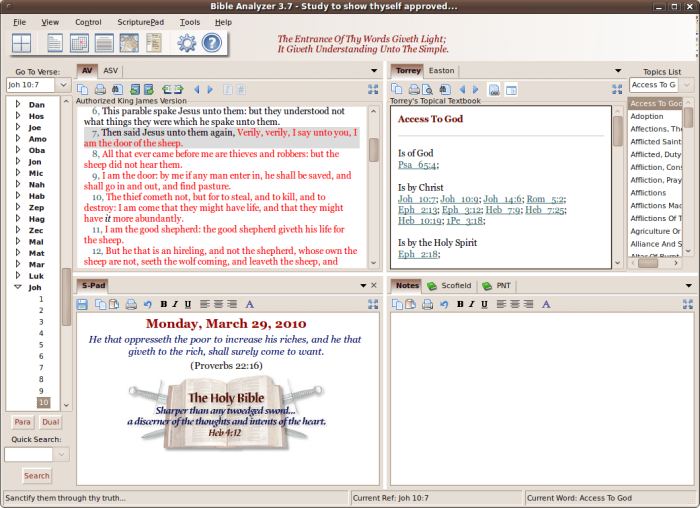Bible Analyzer is a comprehensive Bible study and analysis application with a number of features not typically found in other bible software such as text comparison, proximity searches, detailed statistics, etc.
Bible Analyzer was developed to aid believers in their study, analysis, and application of the word of God.
It has some advanced features.
Features include:
- List every difference between two Bible texts.
- Show where a keyword (such as “Lord”) is omitted between two Bible texts.
- Do multi-word proximity searches.
- Show a complete word list of all references (including “Red-Letter”) with a frequency count.
- Ability to search ONLY Christ’s words.
- Display a comprehensive statistics of any Bible book, chapter, or even verse.
- Display the Flesch-Kincaid Grade Level Score for a book or chapter.
- Ability to customize the Titlebar and/or Toolbar.
- Commentary Panel.
- User Notes and Commentary Editor.
- Built-in Word Processor, ScripturePad.
- Foriegn Language support (including Hebrew and Greek).
- A Daily Devotions Display.
- Enhanced Image Viewer.
- Book Reader.
- Improved Search capabilities and statistical features.
- Display the Flesch-Kincaid Grade Level Score for a range of text.
Website: www.bibleanalyzer.com
Support: Manual
Developer: Timothy Morton
License: Bible Analyzer License

| Popular series | |
|---|---|
| The largest compilation of the best free and open source software in the universe. Each article is supplied with a legendary ratings chart helping you to make informed decisions. | |
| Hundreds of in-depth reviews offering our unbiased and expert opinion on software. We offer helpful and impartial information. | |
| The Big List of Active Linux Distros is a large compilation of actively developed Linux distributions. | |
| Replace proprietary software with open source alternatives: Google, Microsoft, Apple, Adobe, IBM, Autodesk, Oracle, Atlassian, Corel, Cisco, Intuit, and SAS. | |
| Awesome Free Linux Games Tools showcases a series of tools that making gaming on Linux a more pleasurable experience. This is a new series. | |
| Machine Learning explores practical applications of machine learning and deep learning from a Linux perspective. We've written reviews of more than 40 self-hosted apps. All are free and open source. | |
| New to Linux? Read our Linux for Starters series. We start right at the basics and teach you everything you need to know to get started with Linux. | |
| Alternatives to popular CLI tools showcases essential tools that are modern replacements for core Linux utilities. | |
| Essential Linux system tools focuses on small, indispensable utilities, useful for system administrators as well as regular users. | |
| Linux utilities to maximise your productivity. Small, indispensable tools, useful for anyone running a Linux machine. | |
| Surveys popular streaming services from a Linux perspective: Amazon Music Unlimited, Myuzi, Spotify, Deezer, Tidal. | |
| Saving Money with Linux looks at how you can reduce your energy bills running Linux. | |
| Home computers became commonplace in the 1980s. Emulate home computers including the Commodore 64, Amiga, Atari ST, ZX81, Amstrad CPC, and ZX Spectrum. | |
| Now and Then examines how promising open source software fared over the years. It can be a bumpy ride. | |
| Linux at Home looks at a range of home activities where Linux can play its part, making the most of our time at home, keeping active and engaged. | |
| Linux Candy reveals the lighter side of Linux. Have some fun and escape from the daily drudgery. | |
| Getting Started with Docker helps you master Docker, a set of platform as a service products that delivers software in packages called containers. | |
| Best Free Android Apps. We showcase free Android apps that are definitely worth downloading. There's a strict eligibility criteria for inclusion in this series. | |
| These best free books accelerate your learning of every programming language. Learn a new language today! | |
| These free tutorials offer the perfect tonic to our free programming books series. | |
| Linux Around The World showcases usergroups that are relevant to Linux enthusiasts. Great ways to meet up with fellow enthusiasts. | |
| Stars and Stripes is an occasional series looking at the impact of Linux in the USA. | |

I was pretty disappointed that the developer didn’t offer Strong’s Dictionary for free. To charge for something which is in the public domain is unethical. To compile it and then add to it is also unethical. If the dictionary had been offered for free, I wouldn’t have uninstalled software which cost me approximately half an hour to install (with other modules selected, of course). Further, to require my street address/city/name to purchase the module (granted, for only $3!!) was ridiculous. I bypassed this software solely on the basis that Strong’s wasn’t offered for free. Even if a donation was requested for such, I would likely have agreed (but again, NOT offering my location information!). Strong’s is the first step toward fostering interest in the original languages, moving on to an Interlinear, then embarking on learning the originals.
Pretty disappointed.
As a developer I know that many people who say they would have donated had the program/extension/addon/plugin been free are often being mendacious.